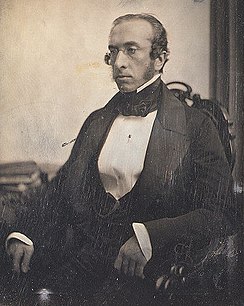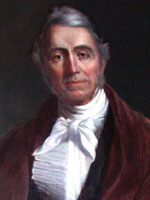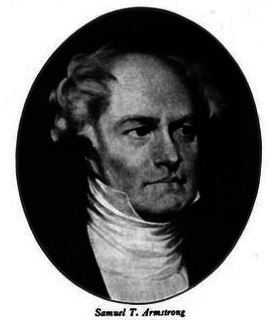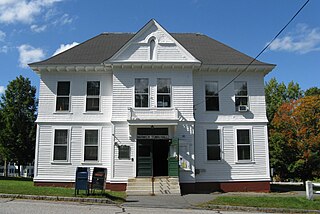
George Bancroft was an American historian and statesman who was prominent in promoting secondary education both in his home state and at the national and international levels. During his tenure as U.S. Secretary of the Navy, he established the United States Naval Academy at Annapolis in 1845. He was a senior American diplomat in Europe. Among his best-known writings is the magisterial series, History of the United States, from the Discovery of the American Continent.

Robert Charles Winthrop was an American lawyer and philanthropist and one time Speaker of the United States House of Representatives. He was a descendant of John Winthrop.

Marcus Morton was an American lawyer, jurist, and politician from Taunton, Massachusetts. He served two terms as Governor of Massachusetts and several months as Acting Governor following the death in 1825 of William Eustis. He served for 15 years as an Associate Justice of the Massachusetts Supreme Judicial Court, all the while running unsuccessfully as a Democrat for governor. He finally won the 1839 election, acquiring exactly the number of votes required for a majority win over Edward Everett. After losing the 1840 and 1841 elections, he was elected in a narrow victory in 1842.

Samuel Turell Armstrong was a U.S. political figure. Born in 1784 in Dorchester, Massachusetts, he was a printer and bookseller in Boston, specializing in religious materials. Among his works were an early stereotype edition of Scott's Family Bible, which was very popular, and The Panoplist, a religious magazine devoted to missionary interests.

Josiah Quincy III was a U.S. educator and political figure. He was a member of the U.S. House of Representatives (1805–1813), Mayor of Boston (1823–1828), and President of Harvard University (1829–1845). The historic Quincy Market in downtown Boston is named in his honor.

Thomson Joseph Skinner was an American politician from Williamstown, Massachusetts. In addition to service as a militia officer during the American Revolution, he served as a county judge and sheriff, member of both houses of the Massachusetts legislature, U.S. Marshal, and member of the United States House of Representatives. He served for two years as Treasurer and Receiver-General of Massachusetts, and after his death an audit showed his accounts to be deficient for more than the value of his estate, which led to those who had posted bonds on his behalf having to pay the debt.

Leverett Saltonstall, was a member of the United States House of Representatives from Massachusetts who also served as Speaker of the Massachusetts House of Representatives, President of the Massachusetts Senate, the first Mayor of Salem, Massachusetts and a Member of the Board of Overseers of Harvard College.

Charles Hudson was a United States minister, writer, historian and politician. Hudson served in both houses of the Massachusetts General Court, on the Massachusetts Governor's Council, and as United States Representative from Massachusetts.
Lorenzo Sabine was a U.S. Representative from Massachusetts now more remembered for his research and publishing concerning the Loyalists of the American Revolution than as a public servant.

Nathaniel Briggs Borden was a businessman and politician from Fall River, Massachusetts. He served as a U.S. Representative from Massachusetts's 10th congressional district, with two non-concurrent terms between 1835 and 1843. He later served as a member of the Massachusetts General Court, first as a state Senator, and later a state representative. He also served as the third mayor of Fall River. His business career included interests textile mills, banking and railroads. He was the younger brother of noted land surveyor Simeon Borden.
Samuel Hurd Walley was a Massachusetts businessman and politician who served as Speaker of the Massachusetts House of Representatives and as a member of the U.S. Representative from Massachusetts.

Frederick Octavius Prince was an American lawyer, politician, and mayor of Boston, Massachusetts.
John Sherburne Sleeper (1794–1878) was an American sailor, ship master, novelist, journalist and politician.
The Yorick Club was a private social club in Lowell, Massachusetts, which twenty prominent young Lowell men founded in February 1882. The club went bankrupt in 1979 and was dissolved; its former clubhouse is now Cobblestones Bar & Restaurant.
Nathaniel Wright was an American businessman and lawyer who was the fourth Mayor of Lowell, Massachusetts.
Charles Adams Stott was a Massachusetts businessman who served in the Massachusetts House of Representatives; and as a member of the Common Council, Board of Aldermen, and the twenty-fourth mayor of Lowell, Massachusetts.
Jonathan P. Folsom served as the twentieth Mayor of Lowell, Massachusetts.
The following is a timeline of the history of Lowell, Massachusetts, US.
Hugh Cummiskey was a leader of the early Irish community in Lowell, Massachusetts in the United States.
John Abbot Goodwin was a U.S. educator, journalist and politician who served as a member, and from 1860 to 1861, as the Speaker of the Massachusetts House of Representatives.















